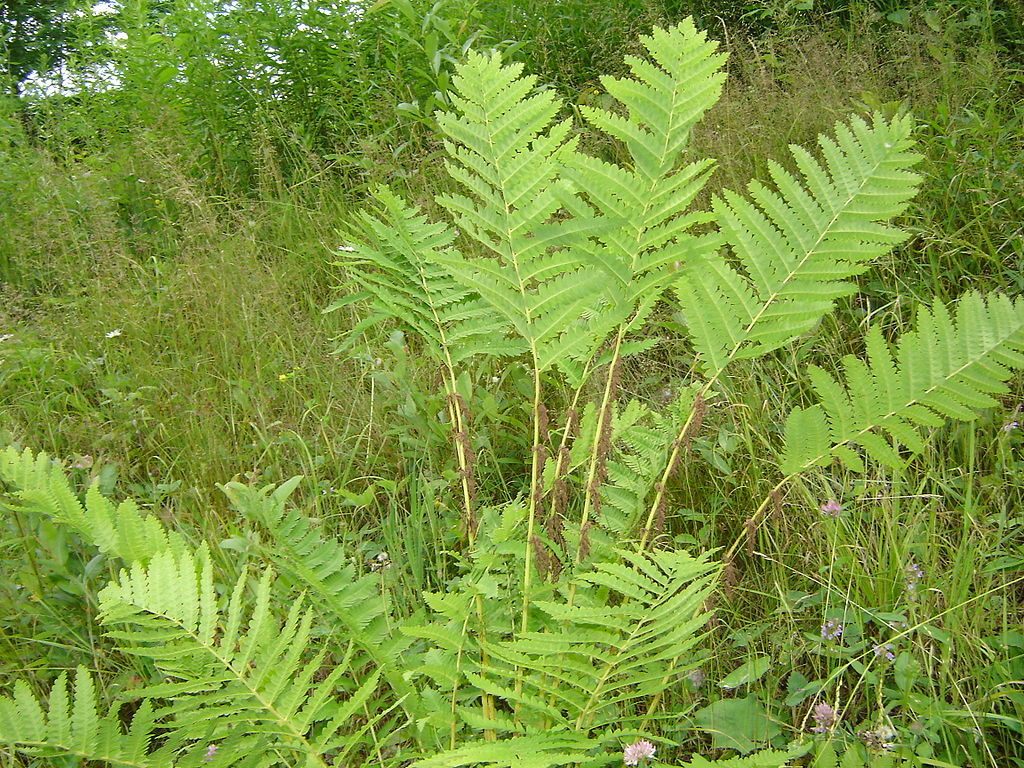Another showery day, or rather shower threatening. A very cold day at this season. Yet I do not need fire in the house.
This violent and cool wind must seriously injure the just developed tender leaves. I never observed so much harm of this kind done. Leaves of all kinds are blown off and torn by it, as oak, maple, birch, etc.
As I sit under a white oak, I see the fragments torn off — a quarter or half the leaf — filling the air and showering down at each ruder blast, and the ground is spotted green with them. There are not many whole leaves of the white oak blown off, but these torn fragments rather.
At the Assabet stone bridge, the water along the shore is lined with a broad green mass of them, which have been blown into it, three or four feet wide, washed against the shore. Such a wind makes tearing work with them, now that they are so tender.
There is much handsome interrupted fern in the Painted-Cup Meadow, and near the top of one of the clumps we notice something like a large cocoon, the color of the rusty cinnamon fern wool.
It is a red bat, the New York bat, so called. It hangs suspended, head directly downward, with its little sharp claws or hooks caught through one of the divisions at the base of one of the pinnae, above the fructification. Its wings are very compactly folded up, the principal bones (darker-reddish) lying flat along the under side of its body, and a hook on each meeting its opposite under the chin of the creature. It does not look like fur, but more like the plush of the ripe cat-tail head, all trembling in the wind and with the pulsations of the animal.
It is a red bat, the New York bat, so called. It hangs suspended, head directly downward, with its little sharp claws or hooks caught through one of the divisions at the base of one of the pinnae, above the fructification. Its wings are very compactly folded up, the principal bones (darker-reddish) lying flat along the under side of its body, and a hook on each meeting its opposite under the chin of the creature. It does not look like fur, but more like the plush of the ripe cat-tail head, all trembling in the wind and with the pulsations of the animal.
I cannot but think that its instinct taught it to cling to the interrupted fern, since it might readily be mistaken for a mass of its fruit.
H.D. Thoreau, Journal, June 10, 1860
Another showery day, or rather shower threatening. 2 P.M. — To Annursnack.
A very strong northwest wind, and cold. At 6 P.M. it was 58º. This, with wind, makes a very cold day at this season. Yet I do not need fire in the house.
There is much handsome interrupted fern in the Painted-Cup Meadow, and near the top of one of the clumps we noticed something like a large cocoon, the color of the rusty cinnamon fern wool.
It was a red bat, the New York bat, so called. It hung suspended, head directly downward, with its little sharp claws or hooks caught through one of the divisions at the base of one of the pinnæ, above the fructification.
It was a delicate rusty brown in color, very like the wool of the cinnamon fern, with the whiter bare spaces seen through it early in the season. I thought at first glance it was a broad brown cocoon, then that it was the plump body of a monstrous emperor moth.
It was rusty or reddish brown, white or hoary within or beneath the tips, with a white apparently triangular spot beneath, about the insertion of the wings.
Its wings were very compactly folded up, the principal bones (darker-reddish) lying flat along the underside of its body, and a hook on each meeting its opposite under the chin of the creature.
It did not look like fur, but more like the plush of the ripe cat-tail head, though more loose, — all trembling in the wind and with the pulsations of the animal.
I broke off the top of the fern and let the bat lie on its back in my hand. I held it and turned it about for ten or fifteen minutes, but it did not awake. Once or twice it opened its eyes a little, and even it raised its head, opened its mouth, but soon drowsily dropped its head and fell.
It was more attentive to sounds than to motions. Finally, by shaking it, and especially by hissing or whistling, I thoroughly awakened it, and it fluttered off twenty or thirty rods to the woods.
I cannot but think that its instinct taught it to cling to the interrupted fern, since it might readily be mistaken for a mass of its fruit.
Raised its old-haggish head.
Unless it showed its head wide awake, it looked like a tender infant.






No comments:
Post a Comment